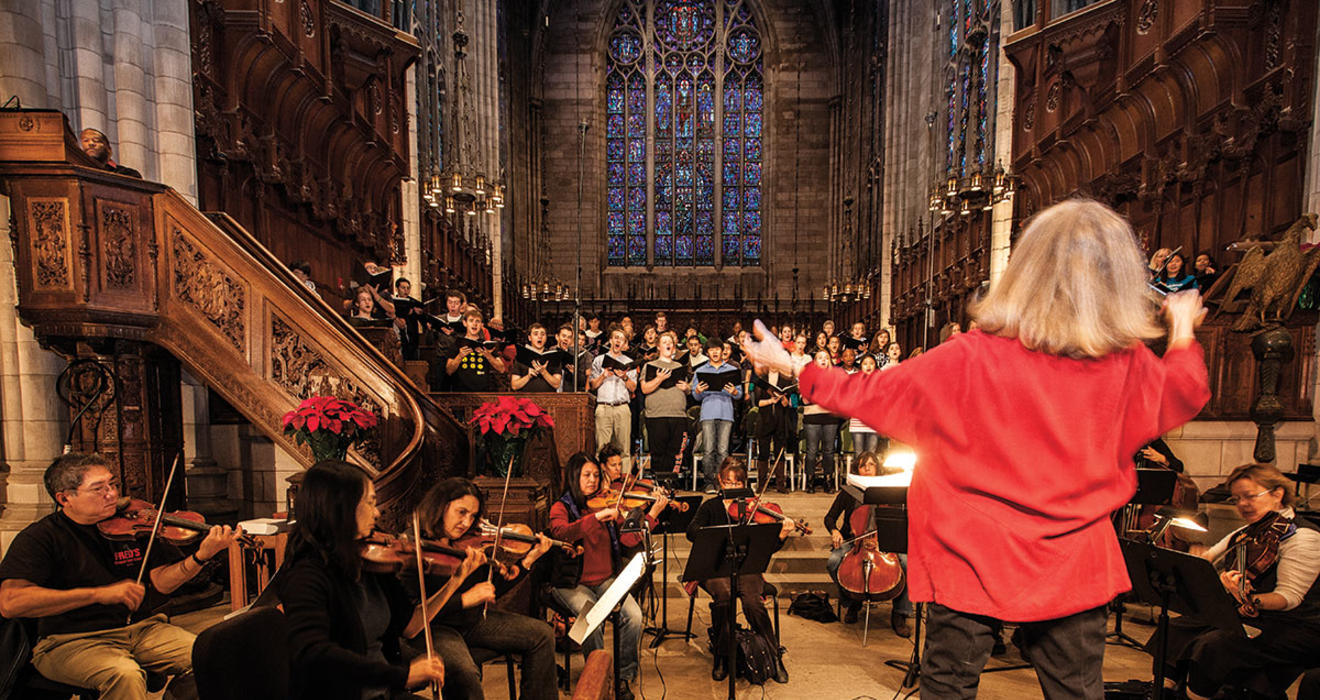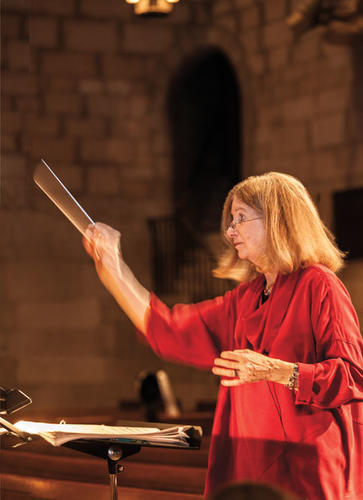
Every Sunday morning, when many Princeton students remain tucked in their beds after a night of carousing, the Chapel Choir bursts into joyous song. As singers’ voices bounce off the vaults of the world’s third-largest college chapel, the congregation must wonder how these relatively inexperienced musicians achieve such excellence, week after week.
Credit goes to Penna Rose, director of Chapel music for 20 years. “She is working with college kids, but she has more energy than all of us,” says tenor Jeffrey Chen ’13. Rose has greatly increased the size of the choir, which now has about 80 members. Most are students, who sing alongside a few residents of the town.
Rose works hard to pep up the singers during thrice-weekly rehearsals. They perform at top-notch “only when they have to, and not a minute before,” she says, so rehearsals are often disappointing. “At 10 a.m. Sunday I’ll think, ‘I can’t let these people sing in public,’ but 11 comes and they are perfect.”
Every fall, Rose auditions about 100 prospective singers, tapping about half of them. In the 1990s she could safely ask them to sing “The Star-Spangled Banner” as their trial song; today, she asks for the anthem of whatever country they happen to come from.
A small percentage of the members grew up singing in a church; many more were in school choruses; a few have no choir experience. “Not everyone has the same experience of choral singing, nor do they bring the same gifts,” Rose tells them. “Some have great pitch; some have great sight-reading; some have great interpretive powers. But the end result is what counts. We must agree to do this together without a sense of hierarchy.”
Her methods can be unorthodox: In a recent rehearsal, when the choir wasn’t quite hitting a high note, she had members sing it while standing on tiptoe. When that didn’t work, she had them do the same while holding their chairs over their heads, really stretching. That time they hit it.
After two sessions of midweek rehearsals in the crypt downstairs, the choir conducts a final practice of every song in the Chapel itself, where extra enunciation is required in the cavernous space, with its majestic 4½-second reverberation. “The sound goes from front to back and then bounces off,” says Chen. “The last note we sing, you hear it echo and echo.”
“I use the Chapel as a big playground — let’s see what we can do,” says Rose. Sometimes she scatters choir members in different locations, taking advantage of acoustical quirks to get “wraparound sound”: The balcony, for example, acts as a powerful acoustical shell.
“A lot of choirs sing only a couple of times a year,” says alto Gitanjali Gnanadesikan ’14, whose father also sang in the Chapel Choir. “Last year we did 101 anthems, in addition to all the hymns. They ranged from gospel to Bach to Rachmaninoff to modern composers.” It’s a challenge for young choristers to learn so much unfamiliar music week after week, all of it in the original language. Hungarian is particularly jaw-breaking.
Rose calls choral singing “a powerful, breath-filled act,” and stresses stamina and follow-through. Among the many “Penna-isms” students have recorded is, “I don’t care if the building is on fire, you finish this piece!” A few years ago, the power conked out in the middle of a service, plunging everyone into darkness and extinguishing the sounds of the grand organ, which requires electricity for the blowers that provide wind to the pipes. The choir went on singing as if nothing had happened.
Students stress how much they have learned from Chapel Choir, not all of it musical. “I’ve learned about being a responsible member of a group,” says Chen. “Penna says at the start of the year, ‘It’s a job, and you should treat it like one.’ ”
Choir members earn $8 an hour. But the choir is much more than a job — it’s a family. Last year, on one of the choir’s occasional tours to Europe, an awestruck Chen found himself singing a Mozart mass in the Stephansdom (St. Stephen’s Cathedral) in Vienna, on Mozart’s birthday. “It was so cold, you could see your breath as you sang,” he remembers. “It was an incredible bonding moment that we all had.”
Each Sunday, the choir hopes to move the congregation emotionally. “If there’s not somebody in that audience in tears,” Rose says during rehearsals, “you have not done your job.”
“I hope to infect students with the love and the need for choral music,” she says. “Maybe when they’re here, they don’t fully understand the power of doing this. But they will later.”







1 Response
Stephen S. Sechrist III ’76
10 Years AgoMusic at Princeton
W. Barksdale Maynard ’88’s feature in the Jan. 16 issue (“Hitting the high notes”) brought back many wonderful memories of singing in the Chapel Choir. I remember being intimidated, hearing the choir conducted by Carl Weinrich my freshman year. Thank goodness I got up the nerve to audition at the beginning of my sophomore year, Walter Nollner’s first year as director.
The discipline required to attend frequent rehearsals and services was offset by the great reward of singing a large number of masterpieces. Nollner selected a challenging repertory, such as one Bach cantata per month, and I credit him with opening my ears to Renaissance music and introducing me to Schubert’s Mass in E-flat Major. He planned our trip to Europe, where we sang Mozart in Salzburg and Vienna, Josquin in St. Mark’s and Chartres, and Fauré in the Madeleine.
Two memories stand out. The first was particularly dramatic: During a service, a white dove, which had found its way into the Chapel, made a flight down the center of the nave toward the altar; we had been plunged straight into a Van Eyck painting. The second occurred during our final rehearsal for the Milbank Concert of Haydn’s Seven Last Words of Christ. Power had failed in the Chapel, and Nollner, aware that we needed to practice nevertheless, arranged to have the chancel illuminated by candles. We felt as if we had been transported back in time to the 18th century.
I’m grateful that Princeton made this whole experience possible for me, especially considering my musical inadequacies, and am pleased that current students still have this opportunity. It should prove to be one of their finest academic memories as well.